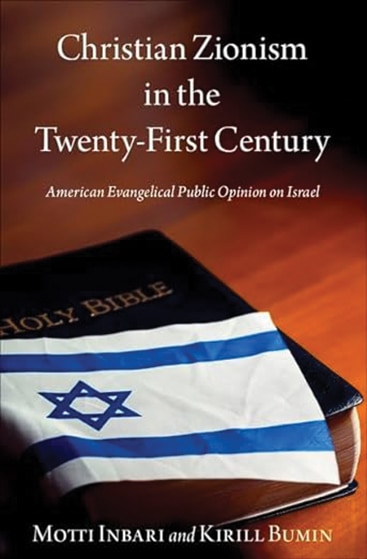Book Review:
 What do Christians today really think about the modern State of Israel? Over the past several years, Chosen People Ministries has partnered with Lifeway Research and two Jewish scholars, Motti Inbari and Kirill Bumin, to conduct surveys of American evangelical views of Israel. These scholars analyze the results of the 2018, 2020, and 2021 surveys in their book Christian Zionism in the Twenty-First Century. [1]
What do Christians today really think about the modern State of Israel? Over the past several years, Chosen People Ministries has partnered with Lifeway Research and two Jewish scholars, Motti Inbari and Kirill Bumin, to conduct surveys of American evangelical views of Israel. These scholars analyze the results of the 2018, 2020, and 2021 surveys in their book Christian Zionism in the Twenty-First Century. [1]
Inbari and Bumin examine the diversity of perspectives toward Israel within the Christian world and dig beyond the simplistic images of evangelical views of Israel perceived by many media outlets. This book presents concrete and recent data regarding American evangelical views of Israel, offering a much-needed corrective to oversimplified assumptions about the Israeli-Palestinian conflict. For instance, they challenge the myth of American Christian indifference to the plight of Palestinians.
Among the most valuable insights Inbari and Bumin glean from the surveys are the motivations of respondents for supporting Israel. Their research reveals two primary Christian beliefs undergirding this support. The first affirms Jewish people as the chosen people upon whom God bestowed a particular land (Genesis 12:3, 15:18–21). The second motivating factor links the founding of the modern State of Israel in 1948 to the fulfillment of biblical prophecy, including setting the stage for Jesus’ return to a literal Jerusalem. [2]
While the book reveals support for Israel remains strong among American evangelicals, it also shows the community is not monolithic. Of respondent demographic factors like ethnicity, age, and geographical region, the age category exhibits the most dramatic differences by far: The under-thirty age bracket is least likely to support Israel. According to the 2021 Lifeway survey, only about 33 percent of this demographic expressed at least some support for Israel.[3] Informed by recent surveys, Inbari and Bumin offer a helpful analysis of why today’s youth differ so dramatically from their evangelical forebears. The scholars also examine open-ended survey answers, which allowed young evangelicals to describe their perspectives in their own words. Notably, young adults who sympathize more with the Palestinian cause are more likely to cite political opinions than biblical evidence.[4]
Christian Zionism in the Twenty-First Century is a valuable contribution to conversations about Christians and the modern State of Israel. Christians who care about Israel will find a rich, up-to-date background on the factors influencing views of modern Israel. Inbari and Bumin’s book will help Christian supporters of Israel understand the reasons young evangelicals tend to think differently about Israel compared to prior generations. Their research illuminates ways for Christians today to continue to stand with Israel.
[1] Motti Inbari and Kirill Bumin, Christian Zionism in the Twenty-First Century: Evangelical Public Opinion on Israel (New York: Oxford University Press, 2024). Motti Inbari is assistant professor of religion at the University of North Carolina at Pembroke, and Kirill Bumin is associate dean of Boston University Metropolitan College.
[2] Ibid, 44.
[3] Ibid, 124.
[4] Ibid, 159.

